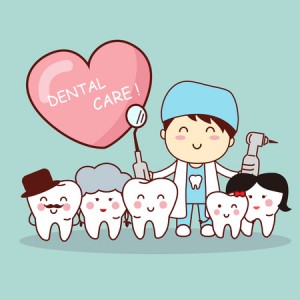Tooth decay is incredibly common and many parents and caregivers think it is unavoidable that their child will get cavities. In fact tooth decay is entirely avoidable through taking preventative action to break the cycle of decay.
How Cavities Are Formed
Cavities are caused when bacteria utilize carbohydrates from foods to produce acid, which when it comes into contact with teeth slowly demineralizes the tooth enamel. Demineralization is a process that gradually erodes or dissolves the tooth enamel and over time cavities can form. These processes are all straightforward and there is plenty of opportunity for parents to intervene.
The first is to make sure your child has great oral hygiene, while the second is to reduce the frequency of carbohydrates on the teeth, perhaps by making some simple dietary changes. The third way to reduce tooth decay is to make teeth more resistant to bacteria through the use of preventative treatments that include fluoride applications and dental sealants.
Great Dental Health Begins Very Early
In order to make sure your child has a healthy mouth, you should bring them to see one of the best pediatric dentist like Dr. Marina Krepkh by age 1 or soon after they get that first tooth. An age one visit might seem very early but it can be enormously helpful for parents and caregivers. Our dedicated team here at the Kids Dentistry Center can work with parents to demonstrate the proper techniques for cleaning their children’s teeth.
We know it isn’t an easy task but it’s so important for good dental health. Children need to have their teeth brushed for them until they are about seven years old. If they do want to brush their teeth on their own before this time, then an adult should closely supervise them and it might be necessary to brush their teeth again afterwards. It takes just a couple of minutes to thoroughly clean a child’s teeth and it’s important to clean them twice a day. This is just four or five minutes out of 1440 minutes in a day.
Get Customised Dietary Advice for Your Child
As well as advice on cleaning teeth, we can offer customized advice on a child’s diet. We can provide you with important information on the type of foods that may be harmful to your child’s oral health and which at first glance may appear to be pretty healthy options. Foods that could be harmful include granola bars and cereals and other foods such as raisins or fruit juices. Even though these foods may contain plenty of vitamins and minerals, they can be enormously high in sugars and the carbohydrates found in granola bars and in cereals often stick to the teeth for hours, providing cavity causing bacteria with a constant source of fuel. It’s even worse when these foods are given as snacks.
As a general rule, if sugar is listed as the first or second ingredient then this food should probably be kept as an occasional treat or should be consumed as part of a main meal. It can be surprisingly easy to improve a child’s dental health by cutting out sugary snacks.
Bottle-feeding, Breastfeeding and Prescription Medications
Our pediatric dentists can also chat to you about bottle-feeding and breastfeeding and any prescription medications, and how this affects your child’s dental health. Although breast milk doesn’t promote tooth decay any more than other kinds of carbohydrates, once your child begins to consume foods in addition to breastmilk, then the combination may put them at risk of developing early childhood caries or tooth decay.
Lots of children find a bottle soothing and parents may put a fussy child to bed with a bottle filled with fruit juice or another sugary liquid. Unfortunately this does mean the teeth are being constantly bathed in sugar which again increases the risk of tooth decay. If a child wants to go to bed with a drink, it should always be plain water. Pacifiers can be another problem, particularly if they are dipped into something sweet to make them more enjoyable.
Prescription medications can sometimes impact a child’s dental health as the medication may contain sugar. Some medications also cause a condition called dry mouth or xerostomia and this can be a problem as saliva has a protective effect on dental health. It helps to wash away excess sugars and decreases acidity in the mouth, lowering the risk of tooth decay.
Keeping an Eye on Your Own Dental Health
Your dental health can directly impact your child’s dental health as children are not born with decay-causing bacteria in their mouths. These bacteria are generally acquired through a child having close contact with their parents or caregivers. Bacteria can be transmitted through kissing a child, by cleaning off a pacifier by mouth rather than by rinsing it, or by sharing eating utensils. Children are most susceptible at acquiring these decay-causing bacteria from six months through to about 31 months. There is increasing evidence that a child’s dental health is closely linked to their parents and their age one visit can be a great opportunity to take stock of your own dental care and to book any checkups and treatment as required.
Preventative Treatments When Your Child Gets a Bit Older
As your child gets older there are lots of different things we can do to help them enjoy great dental health and a cavity-free mouth. Fluoride treatments are particularly useful as fluoride helps to harden tooth enamel, making it more resistant to bacteria. We like to use fluoride varnish which is a quick and non-invasive treatment that is easy for children to tolerate. The fluoride varnish is applied topically as it is painted directly onto the surfaces of the teeth. The varnish is then given time to penetrate the teeth by waiting a couple of hours, sometimes even overnight before being brushed off. It’s a very effective treatment and your child will be able to eat and drink normally during this time.
We can also talk to you about the use of fluoridated toothpaste and mouthwash if required, as it’s important to make sure your child gets sufficient fluoride, but it’s equally important to ensure they don’t receive too much.
Another treatment can be enormously helpful is dental sealants. These are usually applied to the chewing surfaces of newly erupted adult or permanent back teeth and consist of a thin layer of flowable plastic that quickly hardens. Once in place, the plastic is thin enough not to be seen and not to interfere with your child’s bite, but it strong enough to make sure that bacteria cannot penetrate these teeth and it creates a smooth and easy to clean surface.
The reason why we often recommend using dental sealants is because these chewing surfaces can be quite tricky to keep clean as they contain lots of grooves and fissures that can easily trap food and bacteria.
We Make Learning How to Take Care of Your Teeth Lots of Fun
As your child gets older they will want to brush and floss on their own and this is yet another area where we can help. Our pediatric dentists are great at making learning fun and will make sure they use the correct techniques to brush and floss. We can also teach them about the importance of diet so they grow up with a well-rounded dental education that should help them maintain healthy teeth for life.








